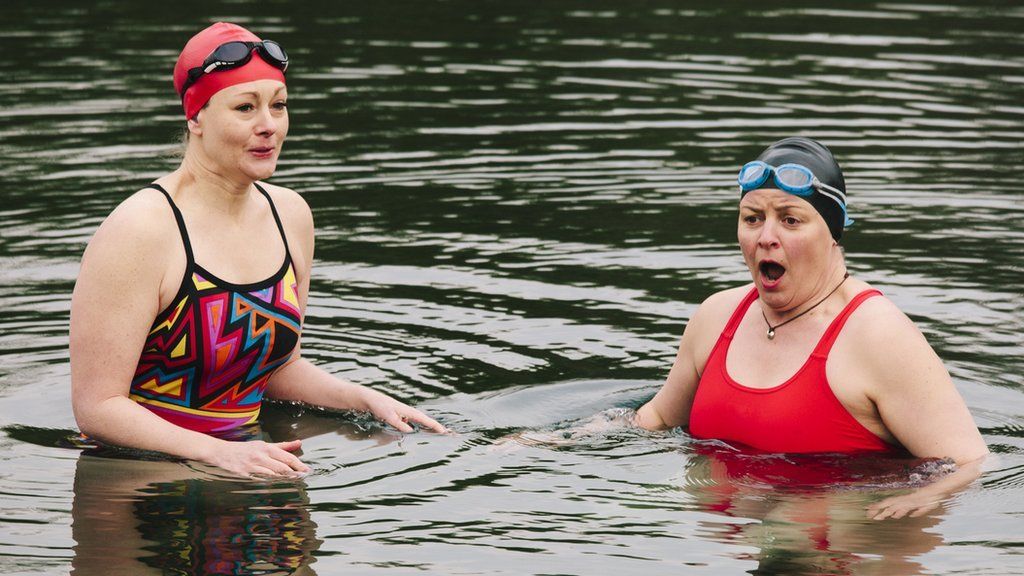New swimming sites for England but are they clean?
- Published
- comments

There are 27 new bathing sites, 16 of them are on rivers
England will get dozens of new monitored bathing sites, the government said on Monday, in the largest ever expansion of wild swimming areas.
Twenty-seven new locations, most of them on rivers, have been designated, which means summer pollution testing.
But the official designation of a bathing site doesn't mean it is clean.
Most of the more than 400 existing swimming spots meet minimum standards but the two river sites currently on the list are both rated "Poor".
The new bathing sites range from a beach in Dorset to Derwentwater in the Lake District and the River Nidd in North Yorkshire.
"Fantastic news" but there's work to be done, says wild swimmer Alison Biddulph
Alison Biddulph is a wild swimmer from Shropshire and has led the successful efforts to get three sites along the River Severn and the River Teme designated. She says the designations are "fantastic news" but has done some testing already and is expecting the Environment Agency to rate the sites as "Poor".
"We definitely have issues in the rivers in Shropshire," she said. "Not just sewage but also agriculture and particularly chicken farms. I'm hoping this will kick start some action locally to clean the waters."
Your device may not support this visualisation
"I am fully committed to seeing the quality of our coastal waters, rivers and lakes rise further for the benefit of the environment and everyone who uses them," said Water Minister Robbie Moore.
Is bathing water improving? BBC Environment Correspondent Jonah Fisher asks Water Minister Robbie Moore live on BBC Breakfast
Last year out of the 423 bathing sites measured in England, 405 met at least the minimum standard of the Bathing Water Regulations. But the number rated as "Excellent" fell and the number rated as "Poor" rose to its highest level since 2015.
Designated sites are tested by the Environment Agency throughout the bathing season, which lasts from 15 May to the end of September.
The samples have to be processed within 24 hours so are sent by courier to an EA laboratory at Starcross near Exeter, where a team of scientists analyse them.
Jonathan Porter of the Environment Agency at the laboratory near Exeter where bathing water is tested.
"We're looking for two different types of bacteria, e. coli and intestinal enterococci," says Jonathan Porter, a microbiologist at the Environment Agency.
"Those are used to indicate the possible presence of faecal material - poo - in the water, which could have come from many different sources, humans, farm animals, birds, or dogs."
The results are then published on the Environment Agency's Swimfo website, external and the site given a rating. Too much bacteria linked to poo and the bathing site gets a "Poor" rating which means a sign advising people not to swim is put up.
Claire Robertson says having her local swimming site designated has helped
Wolvercote Mill Stream in Oxford is a good example of what may lie ahead for the 16 new river bathing sites. It was designated two years ago but in both 2022 and 2023 its water quality was rated as "Poor". But the official designation and the testing regime that comes with it does seem to be focusing attention, albeit slowly.
"It's in the law that if a designated bathing water site fails, then the water company, the local authority and the Environment Agency have to work together to improve that water quality," Claire Robertson from campaign group Thames21 says. "If we hadn't had the designation we wouldn't have had the investigation and the promises of upgrades we've had."
Those promises have yet to produce cleaner bathing water. And the clock is ticking. If a bathing site is rated "Poor" for five years in a row it loses both its designation and its testing regime.
Sign up for our Future Earth newsletter to get exclusive insight on the latest climate and environment news from the BBC's Climate Editor Justin Rowlatt every Tuesday. If you are outside the UK, sign up to our international Future Earth newsletter here., external